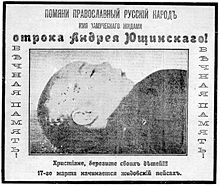Blood libel (also blood accusation) refers to a false accusation or claimthat religious minorities, almost always Jews, murder children to use their blood in certain aspects of their religious rituals and holidays. Historically, these claims have–alongside those ofwell poisoning and host desecration–been a major theme in European persecution of Jews.[4]
The libels typically allege that Jews require human blood for the baking of matzos for Passover. The accusations often assert that the blood of Christian children is especially coveted, and historically blood libel claims have often been made to account for otherwise unexplained deaths of children.
This morning, Sarah Palin released an extensive statement on video and and on Facebook, "refudiating" her critics. At one point in the video she claims,
....within hours of a tragedy unfolding, journalists and pundits should not manufacture a blood libel that serves only to incite the very hatred and violence they purport to condemn.
Palin is being too clever by half. She's deliberately using a short pithy phrase supporters and the mainstream media can latch onto, and repeat ad nauseum. But what she's done is misappropriated a term that has haunted Jews for centuries and made our own blood run cold.
That she, and they, don't even understand what "blood libel" really means is just grotesque. In fact, the use of "blood libel" against the Jews in Eastern Europe was a precursor to the Holocaust, and cost hundreds of thousands their lives in the late 1800's.
"Blood libel" is the reason I can't trace my family tree on my father's side back farther than the late 1800's in Disna Vilna, Ukraine.
That Palin would use it when one of the real victims in this tragedy, Gabrielle Giffords, is Jewish is beyond belief.
Here are but a few examples.
- 1840 Damascus affair: In February, at Damascus, a Catholic monk named Father Thomas and his servant were murdered. The accusation of ritual murder was brought against members of the Jewish community of Damascus
- 1840 Rhodes blood libel: The Jews of Rhodes, during the Ottoman Empire, were accused of murdering a Greek Christian boy. The libel was supported by the local governor and the European consuls posted to Rhodes. Several Jews were arrested and tortured, and the entire Jewish quarter was blockaded for twelve days. An investigation carried out by the central Ottoman government found the Jews to be innocent.
- In March 1879, ten Jewish men from a mountain village were brought to Kutaisi, Georgia to stand trial for the alleged kidnapping and murder of a Christian girl. The case attracted a great deal of attention in Russia (of which Georgia was then a part): "While periodicals as diverse in tendency as Herald of Europe and Saint Petersburg Notices expressed their amazement that medieval prejudice should have found a place in the modern judiciary of a civilized state, New Times hinted darkly of strange Jewish sects with unknown practices."The trial ended in acquittal, and the orientalist Daniel Chwolson published a refutation of the blood libel.
- 1882 Tiszaeszlár blood libel: The Jews of the village Tiszaeszlár, Hungary were accused with the ritual murder of a fourteen-year-old Christian girl, Eszter Solymosi. The case was one of the main causes of the rise of antisemitism in the country. The accused persons were eventually acquitted.
- In the 1899 Hilsner Affair, Leopold Hilsner, a Jewish vagabond, was accused of murdering a nineteen-year-old Christian woman, Anežka Hrůzová, with a slash to the throat. Despite the absurdity of the charge and the relatively progressive nature of society in Austri-Hungary, Hilsner was convicted and sentenced to death. He was later convicted of an additional unsolved murder, also involving a Christian woman. In 1901, the sentence was commuted to life imprisonment. Tomáš Masaryk, a prominent Austro-Czech philosophy professor and future president of Czechoslovakia, spearheaded Hilsner's defense. He was later blamed by Czech media because of this. In March 1918, Hilsner was pardoned by Austrian emperor Charles I. He was never exonerated, and the true guilty parties were never found.

- The 1903 Kishinev pogrom, an anti-Jewish revolt, started when an anti-Semitic newspaper wrote that a Christian Russian boy, Mikhail Rybachenko, was found murdered in the town of Dubossary, alleging that the Jews killed him in order to use the blood in preparation of matzo. Around 49 Jews were killed and hundreds were wounded, with over 700 houses being looted and destroyed.
- In the 1910 Shiraz blood libel, the Jews of Shiraz, Iran, were falsely accused of murdering a Muslim girl. The entire Jewish quarter was pillaged; the pogrom left 12 Jews dead and about 50 injured.
- In Kiev, a Jewish factory manager, Menahem Mendel Beilis, was accused of murdering a Christian child and using his blood in matzos. He was acquitted by an all-Christian jury after a sensational trial in 1913.
- In 1928, the Jews of Massena, New York, were falsely accused of kidnapping and killing a Christian girl in the Massena blood libel.
- The 1946 Kielce pogrom against Holocaust survivors in Poland was sparked by an accusation of blood libel.
- King Faisal of Saudi Arabia (r. 1964–1975) made accusations against Parisian Jews which took the nature of a blood libel.
- The Matzah Of Zion was written by the Syrian Defense Minister, Mustafa Tlass in 1986. The book concentrates on two issues: renewed ritual murder accusations against the Jews in the Damascus affair of 1840, and The Protocols of the Elders of Zion. The book was cited at a United Nations conference in 1991 by a Syrian delegate.




No comments:
Post a Comment